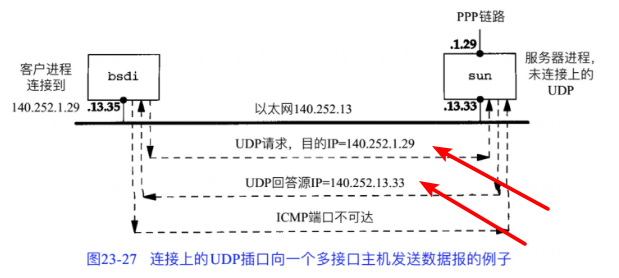IP_PKTINFO选项
UDP 在多网卡的情况下,可能会发生服务器端回复报文源地址不对的情况。目前这种情况在portal 对接ac的时候经常出现

所以问题就是:需要保存本次udp 请求的local ip remote ip
IP_PKTINFO 这个选项就是让内核在 socket 中保存 IP 报文的信息,当然也包括了报文的源地址和目的地址。IP_PKTINFO 和 msghdr 的关系可以在这个 stackoverflow 中找到:
https://stackoverflow.com/questions/3062205/setting-the-source-ip-for-a-udp-socket。
The code in the link uses IP_PKTINFO (or IP_RECVDSTADDR depending on the platform) to get the destination address of a UDP message from the ancillary cmsg(3) data. Paraphrased here:
struct msghdr msg;
struct cmsghdr *cmsg;
struct in_addr addr;
// after recvmsg(sd, &msg, flags);
for(cmsg = CMSG_FIRSTHDR(&msg);
cmsg != NULL;
cmsg = CMSG_NXTHDR(&msg, cmsg)) {
if (cmsg->cmsg_level == IPPROTO_IP && cmsg->cmsg_type == IP_PKTINFO) {
addr = ((struct in_pktinfo*)CMSG_DATA(cmsg))->ipi_addr;
printf("message received on address %s\n", inet_ntoa(addr));
}
}Gene, your question asked how to set the source address on outgoing packets. With IP_PKTINFO it is possible to set the ipi_spec_dst field of the struct in_pktinfo in the ancillary data passed to sendmsg(2). See the post referenced above, cmsg(3), and sendmsg(2) for guidelines on how to create and manipulate the ancillary data in a struct msghdr. An example (no guarantee here) might be:
struct msghdr msg;
struct cmsghdr *cmsg;
struct in_pktinfo *pktinfo;
// after initializing msghdr & control data to CMSG_SPACE(sizeof(struct in_pktinfo))
cmsg = CMSG_FIRSTHDR(&msg);
cmsg->cmsg_level = IPPROTO_IP;
cmsg->cmsg_type = IP_PKTINFO;
cmsg->cmsg_len = CMSG_LEN(sizeof(struct in_pktinfo));
pktinfo = (struct in_pktinfo*) CMSG_DATA(cmsg);
pktinfo->ipi_ifindex = src_interface_index;
pktinfo->ipi_spec_dst = src_addr;
// bytes_sent = sendmsg(sd, &msg, flags);结构体in_pktinfo如下,其中ipi_ifindex表示接收报文的接口索引;成员ipi_spec_dst表示报文的本地地址;而ipi_addr表示报文头部的目的地址。在使用sendmsg结构发送报文时,如果ipi_spec_dst字段不为零,在内核中查找路由时,将使用此指定地址为源地址进行查询。再者,如果ipi_ifindex不为零,在查找路由时,此索引所对应的接口的索引作为查找路由时的出接口索引。
struct in_pktinfo {
unsigned int ipi_ifindex; /* Interface index */
struct in_addr ipi_spec_dst; /* Local address 是UDP包中路由目的地址(the destination in_addr)*/
struct in_addr ipi_addr; /* Header Destination
address是UDP包中的头标识目的地址(the receiving interface in_addr) */
};
IP_PKTINFO信息
如下的UDP协议接收函数udp_recvmsg,如果inet_sock套接口cmsg_flags标志不为空,使用函数ip_cmsg_recv_offset添加控制信息。
ip_cmsg_recv_offset--->
if (flags & IP_CMSG_PKTINFO) {
ip_cmsg_recv_pktinfo(msg, skb);
static void ip_cmsg_recv_pktinfo(struct msghdr *msg, struct sk_buff *skb)
{
struct in_pktinfo info = *PKTINFO_SKB_CB(skb);
info.ipi_addr.s_addr = ip_hdr(skb)->daddr;
put_cmsg(msg, SOL_IP, IP_PKTINFO, sizeof(info), &info);
}ipi_addr中保存了报文IP头部的目的地址。结构体in_pktinfo中的其它两个字段保存在skb的回调cb字段,参见宏PKTINFO_SKB_CB。
其余的几个字段在ipv4_pktinfo_prepare 中填充
/**
* ipv4_pktinfo_prepare - transfer some info from rtable to skb
* @sk: socket
* @skb: buffer
*
* To support IP_CMSG_PKTINFO option, we store rt_iif and specific
* destination in skb->cb[] before dst drop.
* This way, receiver doesn't make cache line misses to read rtable.
*/
void ipv4_pktinfo_prepare(const struct sock *sk, struct sk_buff *skb)
{
struct in_pktinfo *pktinfo = PKTINFO_SKB_CB(skb);
bool prepare = (inet_sk(sk)->cmsg_flags & IP_CMSG_PKTINFO) ||
ipv6_sk_rxinfo(sk);
if (prepare && skb_rtable(skb)) {
/* skb->cb is overloaded: prior to this point it is IP{6}CB
* which has interface index (iif) as the first member of the
* underlying inet{6}_skb_parm struct. This code then overlays
* PKTINFO_SKB_CB and in_pktinfo also has iif as the first
* element so the iif is picked up from the prior IPCB. If iif
* is the loopback interface, then return the sending interface
* (e.g., process binds socket to eth0 for Tx which is
* redirected to loopback in the rtable/dst).
*/
struct rtable *rt = skb_rtable(skb);
bool l3slave = ipv4_l3mdev_skb(IPCB(skb)->flags);//indicating a Layer 3 slave device
if (pktinfo->ipi_ifindex == LOOPBACK_IFINDEX)
pktinfo->ipi_ifindex = inet_iif(skb);
//ipi_ifindex索引等于环回接口LOOPBACK_IFINDEX的情况,如果路由缓存中的rt_iif有值,inet_iif函数返回此值作为原始发送接口索引,
//否者,使用skb接口中的skb_iif值,此值在接收路径的函数__netif_receive_skb_core中赋值。
else if (l3slave && rt && rt->rt_iif)
pktinfo->ipi_ifindex = rt->rt_iif;
pktinfo->ipi_spec_dst.s_addr = fib_compute_spec_dst(skb);
} else {
pktinfo->ipi_ifindex = 0;
pktinfo->ipi_spec_dst.s_addr = 0;
}
skb_dst_drop(skb);
}
/*
ipi_ifindex索引等于环回接口LOOPBACK_IFINDEX的情况,如果路由缓存中的rt_iif有值,inet_iif函数返回此值作为原始发送接口索引,
否者,使用skb接口中的skb_iif值,此值在接收路径的函数__netif_receive_skb_core中赋值。
*/
static inline int inet_iif(const struct sk_buff *skb)
{
struct rtable *rt = skb_rtable(skb);
if (rt && rt->rt_iif)
return rt->rt_iif;
return skb->skb_iif;
}
__be32 fib_compute_spec_dst(struct sk_buff *skb)
{
struct net_device *dev = skb->dev;
struct in_device *in_dev;
struct fib_result res;
struct rtable *rt;
struct net *net;
int scope;
/*对于路由缓存中仅有RTCF_LOCAL本地标志,而没有广播和多播标志的情况,返回报文IP头部中的目的地址,
可见此时in_pktinfo结构中的ipi_spec_dst就和ipi_addr成员的值相同
*/
rt = skb_rtable(skb);
if ((rt->rt_flags & (RTCF_BROADCAST | RTCF_MULTICAST | RTCF_LOCAL)) ==
RTCF_LOCAL)
return ip_hdr(skb)->daddr;
/*
否则,如果路由缓存显示为广播或者多播属性,并且如果报文的源IP地址不是零网地址,使用此地址作为目的地址,执行路由查找,
返回查找到的路由中的源地址(FIB_RES_PREFSRC)。其它情况下,使用函数inet_select_addr,也是以报文IP头中的源地址作为目的地址,查找相符的源地址。
*/
in_dev = __in_dev_get_rcu(dev);
net = dev_net(dev);
scope = RT_SCOPE_UNIVERSE;
if (!ipv4_is_zeronet(ip_hdr(skb)->saddr)) {
bool vmark = in_dev && IN_DEV_SRC_VMARK(in_dev);
struct flowi4 fl4 = {
.flowi4_iif = LOOPBACK_IFINDEX,
.flowi4_oif = l3mdev_master_ifindex_rcu(dev),
.daddr = ip_hdr(skb)->saddr,
.flowi4_tos = RT_TOS(ip_hdr(skb)->tos),
.flowi4_scope = scope,
.flowi4_mark = vmark ? skb->mark : 0,
};
if (!fib_lookup(net, &fl4, &res, 0))
return fib_result_prefsrc(net, &res);
} else {
scope = RT_SCOPE_LINK;
}
return inet_select_addr(dev, ip_hdr(skb)->saddr, scope);
}
UDP_SEND IP_PKTINFO控制信息
如下以UDP协议为例,在函数udp_sendmsg中,如果控制消息的长度不为零,首先处理UDP层的控制消息,如果其返回值大于零,表明需要进行IP层控制消息的处理,调用处理函数ip_cmsg_send。
在函数ip_cmsg_send中,将in_pktinfo结构中的成员ipi_ifindex和ipi_spec_dst赋值给ipcm_cookie结构的成员ofi和addr变量。
case IP_PKTINFO:
{
struct in_pktinfo *info;
if (cmsg->cmsg_len != CMSG_LEN(sizeof(struct in_pktinfo)))
return -EINVAL;
info = (struct in_pktinfo *)CMSG_DATA(cmsg);
if (info->ipi_ifindex)
ipc->oif = info->ipi_ifindex;
ipc->addr = info->ipi_spec_dst.s_addr;
break;
}继续看函数udp_sendmsg的后续处理,对于flowi4结构类型变量fl4,其成员flowi4_oif和saddr,赋予了ipc中的oif和addr值,作为查询路由时使用的出接口和源IP地址。
saddr = ipc.addr;
if (!rt) {
struct net *net = sock_net(sk);
__u8 flow_flags = inet_sk_flowi_flags(sk);
fl4 = &fl4_stack;
flowi4_init_output(fl4, ipc.oif, ipc.sockc.mark, tos,
RT_SCOPE_UNIVERSE, sk->sk_protocol,
flow_flags,
faddr, saddr, dport, inet->inet_sport,
sk->sk_uid);
security_sk_classify_flow(sk, flowi4_to_flowi(fl4));
rt = ip_route_output_flow(net, fl4, sk);
if (IS_ERR(rt)) {
err = PTR_ERR(rt);
rt = NULL;
if (err == -ENETUNREACH)
IP_INC_STATS(net, IPSTATS_MIB_OUTNOROUTES);
goto out;
}
err = -EACCES;
if ((rt->rt_flags & RTCF_BROADCAST) &&
!sock_flag(sk, SOCK_BROADCAST))
goto out;
if (connected)
sk_dst_set(sk, dst_clone(&rt->dst));
}



 浙公网安备 33010602011771号
浙公网安备 33010602011771号